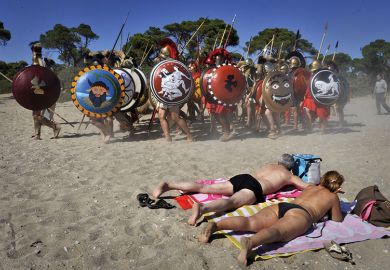Learned societies are often considered a force for good in the British academy. Non-profit, “venerable” and run by those focused on promoting the health of their disciplines, they are seen by traditionalists as the last bastions of academic freedom in an era of increasing commercialisation and managerialism.
But their amateurishness and lack of accountability also lead to abuses of power. I was recently forced to resign from a learned society after being subjected to antediluvian processes seemingly designed purposefully to protect the prejudiced and the powerful.
My position became untenable after I raised a complaint against my employer covering hate speech and directorial dereliction of duties. I could, perhaps, have claimed constructive dismissal, but was so exhausted by the end of the process that I couldn’t face the prospect of more legal wrangling.
The society is a small but wealthy charity that dispenses grants and student bursaries, as well as running lecture courses and school programmes around the UK. It is a “traditional” establishment, housed in an ancient building, holding annual dinners in private gentlemen’s clubs and lectures in cobwebbed halls.
Being a Jewish man, racialised as white, I was (in the words of one co-worker) the most “ethnic” person on the payroll. This was one of the milder forms of political incorrectness that I heard while working there. There was routine use of sexist, homophobic, racist, Islamophobic and antisemitic slurs, which sometimes shifted into language that was threatening or abusive: the definition of hate speech.
The society employed no women while I was working there and was comfortable in its misogynistic outlook. All-male panels were a frequent occurrence. A former officer has written openly and unapologetically about his sexual harassment of his female students.
I had no contract, job description or holiday pay. There was no HR department, employees’ handbook, or equality and diversity training. I worked part-time while pursuing my PhD (and latterly, postdoctoral research) and was inevitably worried about the insecurity of my position.
I was also worried by the society's old-fashioned governance model. Having previously disenfranchised its membership, its power nominally rested in the hands of its council, consisting of a few dozen professionals. In reality, power was wielded by its chairman and long-serving, unelected director. They ran the society to further their own political agendas, belying its claimed commitment to ideological neutrality.
I reached out to my line manager about these issues, but there was no uptake. I approached council members to ask their advice. One suggested I complete my PhD and move on. This pattern of reaching out and being gently rebuffed continued until frustration drove me to email the executive committee to lodge a formal complaint.
Scholar-activist Sara Ahmed has written with wonderful clarity about the institutional obstacles created to dissolve complaint. The society succeeded in realising almost all of them.
Its immediate response was the shutdown of dialogue. The chairman instructed the committee not to respond. The vice-chair suggested that I meet with him for “a coffee and a chat”, with the aim, it seemed, of undermining the seriousness of my complaint. I declined, suggesting that any meeting should be recorded. I had no union representation (having left my higher education union when I finished teaching) but was accompanied to subsequent meetings by professorial colleagues.
It wasn’t long before I was told that information had emerged about “inappropriate conduct” on my part at a meeting earlier that year, where I had supposedly brought the society into disrepute by questioning editorial decisions. The vice-chair suggested that disciplinary action might be pursued against me. I was disheartened by the boldness of this retaliation.
It continued. My complaint included testimony from a related party, alleging sexual discrimination and assault, but it was dismissed as irrelevant since the society construed my complaint as “personal” rather than “corporate”. I could only raise concerns about the society in so far as they related to me. The other charges of hate speech were similarly suppressed.
My complaint about antisemitism was upheld, but the grievance report that emerged was profoundly dismissive of my concerns. I appealed. I suggested that the society find an impartial investigator to consider my claims. After some deliberation, it reluctantly agreed that this was necessary – then appointed a member of its own executive committee to head the inquiry. Unsurprisingly, the society was found to be entirely above reproach.
The investigation into my complaint ended. The investigation into my so-called inappropriate conduct continued without resolution.
Over the 10 months of the grievance process, I lost weight and became sleep-deprived. Sometimes I would wake in the night with shards of enamel in my mouth, ground off my teeth by the stress. It would, however, have been much worse without the support of my partner, friends and family. I’m lucky that my parents offered financial support with the legal fees; I doubt I would have raised the complaint without this safety net.
Some good did come out of it. Bolstered by support from a sympathetic committee member, my complaint eventually resulted in the creation of an HR department. My successor will have a contract, a job description and holiday pay. And they will not have to suffer the politically regressive dinners in the men-only gentlemen’s clubs.
These gains, however, were hard won. Ahmed is right: there is insufficient structural support for effective institutional critique. I was naive – and arrogant – in thinking that there would be uptake. I learned that for all their verbal support, the “milder” elements in societies such as these will typically defer to – and therefore support – the prevailing orthodoxy, to avoid conflict and confrontation.
I have since moved into another line of work, determinedly outside the academy.
The author has chosen to remain anonymous.
POSTSCRIPT:
Print headline: Old boys' clubs
Register to continue
Why register?
- Registration is free and only takes a moment
- Once registered, you can read 3 articles a month
- Sign up for our newsletter
Subscribe
Or subscribe for unlimited access to:
- Unlimited access to news, views, insights & reviews
- Digital editions
- Digital access to THE’s university and college rankings analysis
Already registered or a current subscriber? Login








